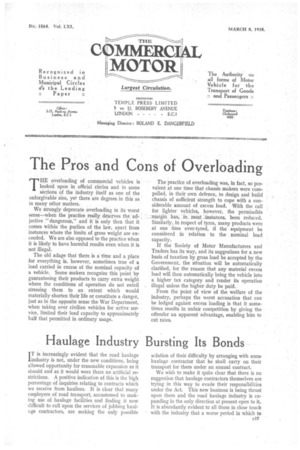The Pros and Cons of Overloading
Page 39

If you've noticed an error in this article please click here to report it so we can fix it.
THE overloading of commercial vehicles is looked upon in official circles and in some sections of the industry itself as one of the unforgivable sins, yet there are degrees in this as in many other matters.
We strongly deprecate overloading in its worst sense—when the practice really deserves the adjective "dangerous," and it is only then that it comes within the purlieu of the law, apart from instances where the limits of gross weight are exceeded. We are also opposed to the practice when it is likely to have harmful results even when it is not illegal.
The old adage that there is a time and a place for everything is, however, sometimes true of a load carried in excess of the nominal capacity of a vehicle. Some makers recognize this point by guaranteeing their products to carry extra weight where the conditions of operation do not entail stressing them to an extent which would materially shorten their life or constitute a danger, just as in the opposite sense the War Department, when taking over civilian vehicles for active service, limited their load capacity to approximately half that permitted in ordinary usage. The practice of overloading was, in fact, so prevalent at one time that chassis makers were compelled, in their own defence, to design and build chassis of sufficient strength to cope with a considerable amount of excess load. With the call for lighter vehicles, however, the permissible margin has, in most instances, been reduced. Similarly, in respect of tyres, many products were at one time over-tyred, if the equipment be considered in relation to the nominal load capacity.
If the Society of Motor Manufacturers and Traders has its way, and its suggestions for a new basis of taxation by gross load be accepted by the Government, the situation will be automatically clarified, for the reason that any material excess load will then automatically bring the vehicle into a higher tax category and render its operation illegal unless the higher duty be paid.
From the point of view of the welfare of the industry, perhaps the worst accusation that can be lodged against excess loading is that it sometimes results in unfair competition by giving the offender an apparent advantage, enabling him to cut rates.














































































































